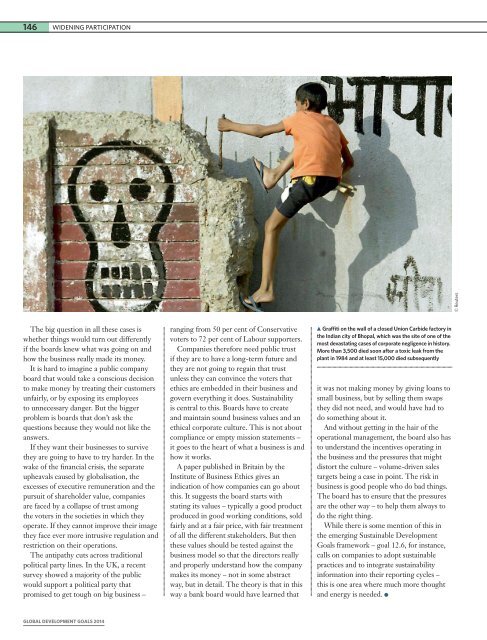FAMBB
FAMBB
FAMBB
You also want an ePaper? Increase the reach of your titles
YUMPU automatically turns print PDFs into web optimized ePapers that Google loves.
146 WIDENING PARTICIPATION© ReutersThe big question in all these cases iswhether things would turn out differentlyif the boards knew what was going on andhow the business really made its money.It is hard to imagine a public companyboard that would take a conscious decisionto make money by treating their customersunfairly, or by exposing its employeesto unnecessary danger. But the biggerproblem is boards that don’t ask thequestions because they would not like theanswers.If they want their businesses to survivethey are going to have to try harder. In thewake of the financial crisis, the separateupheavals caused by globalisation, theexcesses of executive remuneration and thepursuit of shareholder value, companiesare faced by a collapse of trust amongthe voters in the societies in which theyoperate. If they cannot improve their imagethey face ever more intrusive regulation andrestriction on their operations.The antipathy cuts across traditionalpolitical party lines. In the UK, a recentsurvey showed a majority of the publicwould support a political party thatpromised to get tough on big business –ranging from 50 per cent of Conservativevoters to 72 per cent of Labour supporters.Companies therefore need public trustif they are to have a long-term future andthey are not going to regain that trustunless they can convince the voters thatethics are embedded in their business andgovern everything it does. Sustainabilityis central to this. Boards have to createand maintain sound business values and anethical corporate culture. This is not aboutcompliance or empty mission statements –it goes to the heart of what a business is andhow it works.A paper published in Britain by theInstitute of Business Ethics gives anindication of how companies can go aboutthis. It suggests the board starts withstating its values – typically a good productproduced in good working conditions, soldfairly and at a fair price, with fair treatmentof all the different stakeholders. But thenthese values should be tested against thebusiness model so that the directors reallyand properly understand how the companymakes its money – not in some abstractway, but in detail. The theory is that in thisway a bank board would have learned thatGraffiti on the wall of a closed Union Carbide factory inthe Indian city of Bhopal, which was the site of one of themost devastating cases of corporate negligence in history.More than 3,500 died soon after a toxic leak from theplant in 1984 and at least 15,000 died subsequentlyit was not making money by giving loans tosmall business, but by selling them swapsthey did not need, and would have had todo something about it.And without getting in the hair of theoperational management, the board also hasto understand the incentives operating inthe business and the pressures that mightdistort the culture – volume-driven salestargets being a case in point. The risk inbusiness is good people who do bad things.The board has to ensure that the pressuresare the other way – to help them always todo the right thing.While there is some mention of this inthe emerging Sustainable DevelopmentGoals framework – goal 12.6, for instance,calls on companies to adopt sustainablepractices and to integrate sustainabilityinformation into their reporting cycles –this is one area where much more thoughtand energy is needed.GLOBAL DEVELOPMENT GOALS 2014


